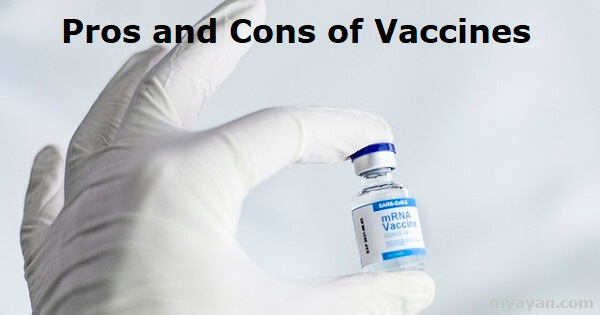According to WHO, vaccines are one of the most cost-effective ways to avoid diseases and save lives. The main concept behind developing vaccines is to cease the spread of diseases by making people immune to them. Vaccines can be administered through injection, orally, or as nasal sprays and conserve lives even before they have access to proper healthcare facilities. Though immunization generally has a good motive behind it, the drug's side effects may backfire sometimes. Here are some pros and cons of vaccines you need to consider.
Vaccination drives are carried out on a massive scale to save the population from a disease that's spreading faster. The following are some common advantages of vaccines:
Vaccination helps develop immunity in individuals against certain diseases before they come into contact with them. It prevents people from getting infected by protecting the body's immune system.
Immunization drives are usually carried out on a massive scale to make healthcare easily accessible, which makes it an inexpensive and safe alternative against various diseases. Every vaccine undergoes a trial and safety check before being administered to people, which prevents any side effects.
Vaccination is important to eliminate and prevent diseases such as smallpox, polio, and measles from the world. Let’s not forget the role of vaccines during the COVID-19 pandemic. As mentioned earlier, vaccines are the best way to protect people and avoid large-scale infections.
Vaccines protect the person receiving them and those who may be unable to get the vaccine due to various health conditions or age by forming a shield around them. This is herd immunity and helps stop a disease from spreading rapidly.
Though vaccines help prevent fatal diseases from spreading, some may experience certain side effects due to their components. Here are some of the cons of vaccines you need to be aware of.
Some people may face allergic reactions due to the components used in vaccines which can also cause severe health issues. Such reactions are more common among people with weak immune systems or existing medical conditions.
With vaccinations becoming increasingly popular nowadays, there is a risk of limited supply due to the growing demand. Even if it helps communities on a large scale, companies manufacturing vaccines may run out of components used in the development of drugs. Ultimately, nations have a shortage of vaccines in certain areas, which may affect the overall protection against diseases.
People who are immunocompromised for various reasons or suffering from other illnesses should consult their doctor before getting a vaccine, as it puts them at risk of catching the same disease they had been vaccinated for.
Vaccines are often developed for diseases that are usually harmless. In this case, the risk of getting ill from a vaccine outweighs the benefits and is unnecessary. Chickenpox is typically characterized by a rash that includes blisters. On the other hand, measles is a fever accompanied by a rash. Similarly, rubella usually manifests as a mild virus with a rash and low-grade fever. It is generally advisable to focus on rehydration and probiotics to treat rotavirus.
Conclusion
Vaccines can save millions of lives by preventing outbreaks of diseases. Before you choose immunization, weigh the pros and cons of vaccines carefully to avoid any unexpected outcomes. Before getting a vaccine, discuss it with your healthcare provider to understand its risks and benefits.

Adverse reactions are possible after vaccination, including common symptoms like redness, soreness at the injection site, fever, and allergic reactions.
Vaccines help your immune system learn how to identify and battle against particular germs. This makes it easier for your immune system to quickly produce antibodies to destroy the virus if you encounter it again. However, there is a possibility that you may still experience a milder version of the illness.
Vaccinations are essential in preventing serious illnesses and even death in children caused by diseases like measles, mumps, and whooping cough. Check out The Diseases Vaccines Prevent and How for further details.
Vaccinating breastfed babies at the recommended ages is necessary as their immune system is not fully developed at birth, which puts them at a higher risk of getting infections. While breast milk helps protect babies from some infections, additional protection through vaccines is important.